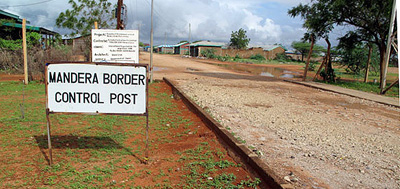
The bold bombing in what had been a stable part of Mogadishu, today, and which killed several government ministers as well as a dozen graduating university students and several journalists, finally catapulted the Somali conflict into the world media, again. According to Google this morning, there were nearly 500 major media stories about the blast, second on the day only to news about Afghanistan.
This major escalation of the terribly complex and horribly bloody Somali conflict comes less than a week after a major battle between two Somali factions temporarily spilled over the Kenyan border at Mandera. This was the second such incident in a month. In October, fierce battles spilled over the border town of Dhobley, about one hundred miles south of Mandera.
Kenyan Internal Security permanent secretary, Francis Kimemia, confirmed Tuesday that Al-Shabaab rebels had captured the border towns opposite Mandera during a weekend of fierce fighting with the rival clan, Hizbul. Kimemia was then quick to say the conflict had been contained in Somalia.
Kenya has many troops and police in this near desert area in its far northeast where Kenya borders Ethiopia and Somalia. Many UK and U.S. soldiers have been seen here, and some openly in the large Kenyan island city of Lamu from which they stage operations.
The U.S. as well as many experts consider Al-Shabaab to be Al-Qaeda, and it is widely known that despite the U.S. support for the internationally created Somali government in Mogadishu, that the U.S. also supports Hizbul, which is trying to overthrow that central government.
The enemy of my enemy is my friend.
But while Al-Shabaab may be responsible for today’s suicide bombing in Mogadishu, the real battle between Al-Shabaab and Hizbul is for the important southern part of the country which borders Kenya, mainly to control the well developed Somali port of Kismayu. This is the center of Somali piracy, the single largest contributor to this tattered country’s GDP and could easily rival Mogadishu in many respects.
Abdullahi Jamaa of Nairobi’s Daily Nation wrote yesterday, “Somali gunmen often prowl along the borderline and their presence is testimony to the fragile security in much of Kenya’s lengthy border [with Somalia]. Over the years, the worsening situation of Somalia has rendered the security of Mandera all but non-existent. Residents live in fear.”
But most Kenyan officials are not worried that actual fighting will spill over from Somalia, and I agree, at least for the foreseeable future. Rather, there are two other immediate problems.
The first are refugees. The Dhobley battle in October sent as many as 2,000 Somalis fleeing into Kenya. Last weekend’s battle in Mandera sent very few, and that is likely because Al-Shabaab has now consolidated its victory over Hizbul for the whole length of the Kenyan border. But caring even for as few as 2,000 refugees is a great drain on Kenyan resources.
The second problem which Kenyan government officials consider even more daunting is the huge inflow of Somali piracy money into the Kenyan black market.
Internal Security Minister Professor George Saitoti says instability in Somalia had led to colossal sums of (pirate) money coming into Kenya illegally.
“And of course when they come here, it may appear initially that it is good for the economy but sooner or later that kind of money ends up distorting the monetary system and the economy as a whole,” the Minister said at a forum recently attended by U.S. Ambassador to Kenya, Michael Ranneberger.
* * *
I believe that Kenya is too stable to be a goal for Al-Qaeda the way Afghanistan and Somalia definitely are. Kenya is too developed, too modern, too secular. I remember all too well the embassy bombing in August, 1998. The first thing we noticed only hours after the bombing was how the city’s residents had set fire to the city’s main mosque.
In the ten years since then, Kenya’s development and integration into the western world has sped up exponentially. Despite the terrible election violence of December, 2007, the country is currently peaceful and in the context of a world recession, actually prosperous.
But what is happening to Somalia is extremely dangerous, and being aside Kenya it gives us an unique and hopefully more urgent perspective.
If we are successful in Iraq and Afghanistan, and if the Pakistanis are at all successful stabilizing their own country, where will Al-Qaeda go?
Somalia.